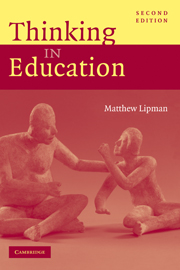Book contents
- Frontmatter
- Contents
- Preface
- Introduction to the Second Edition
- PART ONE EDUCATION FOR THINKING
- PART TWO COMMUNITIES OF INQUIRY
- PART THREE ORCHESTRATING THE COMPONENTS
- 6 The Emotions in Thinking and in Education
- 7 Mental Acts
- 8 Thinking Skills
- PART FOUR EDUCATION FOR THE IMPROVEMENT OF THINKING
- Bibliography
- Index
7 - Mental Acts
Published online by Cambridge University Press: 05 June 2012
- Frontmatter
- Contents
- Preface
- Introduction to the Second Edition
- PART ONE EDUCATION FOR THINKING
- PART TWO COMMUNITIES OF INQUIRY
- PART THREE ORCHESTRATING THE COMPONENTS
- 6 The Emotions in Thinking and in Education
- 7 Mental Acts
- 8 Thinking Skills
- PART FOUR EDUCATION FOR THE IMPROVEMENT OF THINKING
- Bibliography
- Index
Summary
CONSCIOUSNESS AND THE PERFORMANCE OF MENTAL ACTS
Mental acts can be directly present within the student's own process of thinking. Because one of our purposes is to immerse students in thinking, the examination of mental acts can be advantageous. A mental act may play an important part in a dialogue by serving to move the inquiry along. It can be related to a speech act having a tactical role in discourse. The speech act is not something independent of the mental act yet somehow corresponding to it. Rather, it is that portion of the single discursive entity that has developed to the point of utterance. In this sense, speech acts have their roots in ongoing mental performances, while at the same time they interact with other speech acts that are parts of the communal dialogue, and they produce the phenomenon of distributed thinking, in which each participant contributes to the single thinking process. Without the activity of tiny molecules of thought – interacting mental acts – that process would be fairly unintelligible.
Insofar as our aim is to contribute to the understanding of teaching for thinking, it would be very useful to be able to refer to certain components that are understood to be mental performances – in short, mental acts. The intention here is to offer a phenomenological account, rather than an explanatory one, a depiction of how things appear to us to be, while making no claim to explanatory finality.
- Type
- Chapter
- Information
- Thinking in Education , pp. 139 - 161Publisher: Cambridge University PressPrint publication year: 2003



